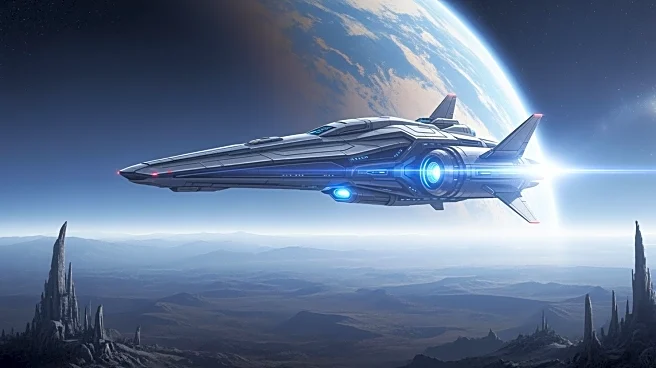What's Happening?
Obsidian Entertainment has released The Outer Worlds 2, a sequel to its popular RPG, The Outer Worlds. The game is set in a new space colony called Arcadia, where players navigate a conflict between two
factions: the Protectorate and Auntie's Choice. The game builds on the foundation of its predecessor, offering a more complex and ambitious experience. Players can expect a variety of gameplay options, including nonviolent resolutions and character-building choices that impact the storyline. The game features a streamlined RPG system with 12 skills, allowing players to specialize in different areas, and introduces a new flaws system that alters characters based on player behavior.
Why It's Important?
The release of The Outer Worlds 2 is significant for the gaming industry as it showcases Obsidian Entertainment's ability to create engaging and complex RPGs. The game's emphasis on player choice and character development reflects a growing trend in the industry towards more personalized gaming experiences. This release could influence future RPGs, encouraging developers to focus on narrative depth and player agency. Additionally, the game's critique of corporate and governmental systems may resonate with players, offering a satirical take on real-world issues. The success of The Outer Worlds 2 could further solidify Obsidian's reputation as a leading developer in the RPG genre.
What's Next?
As The Outer Worlds 2 gains traction, players can expect updates and expansions that may introduce new storylines and gameplay mechanics. The game's reception will likely influence Obsidian's future projects, potentially leading to more sequels or spin-offs within the same universe. The gaming community may also see discussions around the game's themes and mechanics, influencing player expectations for future RPGs. Additionally, the game's success could prompt other developers to explore similar narrative-driven experiences, potentially leading to a shift in the RPG landscape.
Beyond the Headlines
The Outer Worlds 2's exploration of corporate and governmental themes may spark discussions about the ethical implications of such systems in real life. The game's portrayal of factional conflicts and societal issues could lead to a deeper understanding of similar dynamics in the real world. Furthermore, the game's flaws system, which alters characters based on player behavior, may encourage players to reflect on their own decision-making processes and the consequences of their actions. This introspection could extend beyond the game, influencing players' perspectives on real-world issues.









